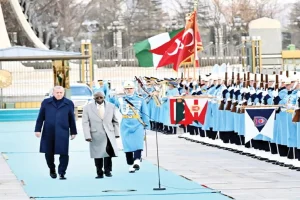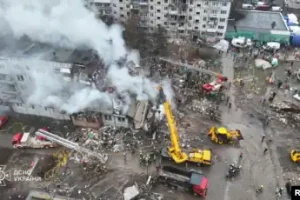Gaza City – At least 20 Palestinians were killed in an Israeli air strike that hit a popular seafront cafe in western Gaza on Monday, according to medics and eyewitnesses. The Al-Baqa Cafeteria, an outdoor venue comprising tents along the beach, was frequently used by activists, journalists, and local residents.
A spokesperson for Gaza’s Hamas-run Civil Defence told the BBC that rescue teams evacuated 20 bodies and dozens of wounded from the scene. Emergency crews were continuing to search through a deep crater left by the explosion.
“I was on my way to the café to use the internet just a few meters away when a massive explosion hit,” Aziz Al-Afifi, a cameraman with a local production company, told the BBC. “I ran to the scene. My colleagues were there, people I meet every day. The scene was horrific – bodies, blood, screaming everywhere.”
Videos shared by activists on social media appeared to show the moment a missile, reportedly from an Israeli warplane, struck the area, with subsequent footage showing bodies scattered across the ground. Al-Baqa Cafeteria had become a well-known spot, offering internet access and workspace along Gaza’s Mediterranean coast.
There has been no immediate comment from the Israeli military regarding the incident.
Widespread Strikes and Displacement
The attack on the cafe followed a wave of Israeli air strikes across the Gaza Strip overnight, which witnesses say triggered the mass displacement of hundreds of Palestinian families. Local reports indicate that rescue teams recovered the bodies of five people, and dozens of injured civilians were taken to Al-Ahli Hospital in Gaza City.
This intense bombardment follows one of the largest evacuation orders issued since the conflict resumed in March. Residents in Gaza City reported dozens of Israeli air raids targeting densely populated eastern neighbourhoods, including Shujaiya, Tuffah, and Zeitoun. Social media videos depicted chaos, with explosions lighting up the night sky, followed by flames and thick plumes of smoke. One strike reportedly hit a school in Zeitoun that had been sheltering displaced families.
“Explosions never stopped… it felt like earthquakes,” Salah, a 60-year-old father of five from Gaza City, told Reuters news agency. “In the news we hear a ceasefire is near, on the ground we see death and we hear explosions.” The five fatalities reportedly occurred in a strike at the Al Shati refugee camp, west of Gaza City.
The Israel Defense Forces (IDF) had earlier instructed residents to evacuate large parts of northern Gaza in anticipation of the attacks. Most of those displaced overnight moved westwards within Gaza City, rather than to the southern region as instructed by the IDF.
“We had no choice but to leave everything behind,” said Abeer Talba, a mother of seven who fled Zeitoun with her family. “We got phone calls recordings in Arabic telling us we were in a combat zone and must evacuate immediately. This is the seventh time we’ve been forced to flee,” she added, stating, “We’re in the streets again, no food, no water. My children are starving. Death feels kinder than this.”
Ceasefire Pressure and Humanitarian Crisis
The latest attacks come amid increasing pressure on Israeli Prime Minister Benjamin Netanyahu to refocus efforts on securing a ceasefire agreement. On Saturday, US President Donald Trump stated on social media that Mr. Netanyahu was “working on negotiating a deal with Hamas ‘right now'”. This followed reports days earlier from a senior Hamas official that mediators had intensified efforts to broker a new ceasefire and hostage release deal, though negotiations with Israel remained stalled.
A two-month ceasefire, which began on January 19th and was intended to have three stages, collapsed in March when Israel launched fresh strikes on Gaza, failing to progress beyond its first phase. This was followed by a total blockade on humanitarian aid deliveries, which was partially eased after 11 weeks due to pressure from US allies and warnings of starvation from global experts.
The partial easing of the blockade saw the creation of the controversial US- and Israeli-backed aid group, the Gaza Humanitarian Foundation (GHF). Since GHF took over distribution operations, there have been almost daily incidents of killings and injuries of Palestinians seeking aid. Eyewitnesses and medics have largely blamed Israel for these incidents, while Israel maintains it has only fired warning shots towards individuals it deemed a threat.
Amid the deepening humanitarian crisis, fears are mounting that the evacuation orders and sustained air strikes are part of a broader Israeli plan to expand its ground offensive deeper into Gaza. However, speculation in Israeli media also suggests that some generals believe military objectives in Gaza are nearing completion. Former army leaders reportedly fear that the conflict could descend into more attritional, guerrilla-style warfare, potentially leading to more casualties among hostages, civilians, and soldiers.
Mr. Netanyahu’s next moves are being closely watched, as he faces increasing domestic and international pressure to pursue a new ceasefire agreement, despite his stated instinct to continue the war and defeat Hamas.





Add Comment